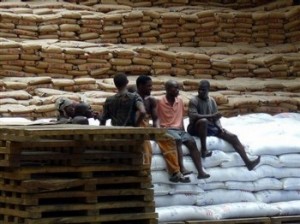By Craig and Marc Kielburger, Global Voices
In 2009, the World Food Programme imported humanitarian aid to about 5.9 million people in Sudan.
The conflict-stricken nation is one of the organization's largest projects. Civil war and ongoing violence have destroyed the country's infrastructure and uprooted its population. That makes sustenance farming virtually impossible and leaves millions facing starvation.
But as food aid stamped with the World Food Programme's logo is shipped to Sudan, thousands of tons of wheat and rice are shipped out.
This food won't end up on the world market. It has specific destinations: Riyadh, Beijing and Seoul to name a few. That's because 840,000 hectares of Sudanese farmland is currently leased to the governments of Saudi Arabia, China and South Korea. They use it for the sole purpose of feeding their growing populations.
Still, Sudan isn't able to feed itself.
"We have millions of acres of land, very flat and unspoiled and it hasn't really been even explored yet," Sudan's Minister of Finance Tarek Shalabi told Bloomberg in December. "Sudan is a very good place for agricultural investment."
Land grabbing, as it's called by opponents, is a new phenomenon. Since 2007, the Gulf States as well as wealthy Asian nations have bought land across the developing world to grow food staples and ship home. But, many of the countries from which they are buying are not food secure themselves.
The trend grew out of the food crisis. When commodity prices soared, arid nations in the Middle East and countries with large populations began searching for cheaper imports.
"They lost faith in the international market's ability to take care of food," says Devlin Kuyek, a researcher with GRAIN, a non-profit that supports small-scale farmers. "They took a more aggressive approach by looking for ways to buy up farmland for their own food needs."
Through government-backed corporations and sovereign wealth funds, the World Bank estimates 50 million hectares have been bought for food production. That's roughly equivalent to half of China's farmland. The deals are private so details are difficult to identify. But, most acquisitions are long-term leases, concessions or outright purchases ranging in length from 30 to 99 years.
China and the United Arab Emirates have already secured deals with the Democratic Republic of Congo and Senegal respectively. In Sept., Ethiopia announced three million hectares were for lease.
But, with Congo facing widespread unrest, 20 percent of the Senegalese population officially hungry and 13.7 million Ethiopians in need of emergency food aid, many fear these backroom deals will exacerbate the problem.
"In those places where we've seen the deals going forward, there has been displacement, loss of access to pastoral lands," says Kuyek. "And the jobs these companies are creating have been extremely low paid. They are under some of worst conditions in the world."
GRAIN estimates workers at an Ethiopian farm owned by Indian producers make 70 cents per day. Local farmers have lost their grazing and farm land. Their protests have been put down by police.
"There is a lot of manipulation and zero consultation," says Kuyek. "It goes contrary to any notion of food security and what's good for the local population."
During the financial crisis, food inflation dropped from a peak of 18.2 percent in August 2008 to 4.7 percent in November. But, economists worldwide warn that as the recession eases, prices will start creeping higher. In preparation, Kuyek says we need to secure food for everyone.
Food and Agriculture Organization Director-General Jacques Diouf noted in a meeting at their headquarters that "private investment should be encouraged." But, he added the deals must reflect the needs of developing countries by ensuring fairness and sustenance for local populations.
"We need a food system that looks after people's needs," says Kuyek. "It's not good for countries to go out and secure their own food needs in countries suffering from hunger."













